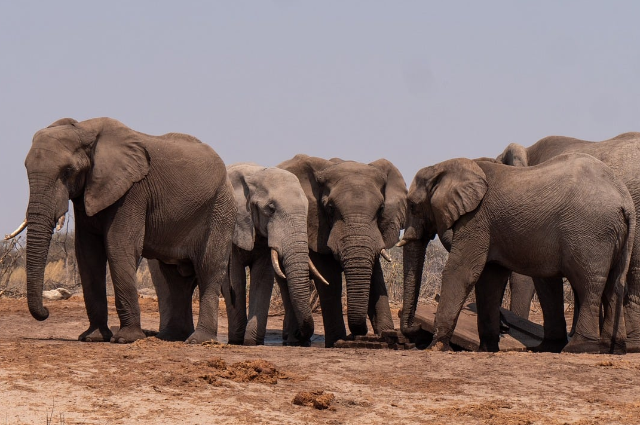
Elephants are integral to the cultural heritage, ecological health, historical legacy, and economic vitality of the Indian subcontinent. Elephants hold immense importance in the Indian subcontinent for several reasons:
Cultural and Religious Significance:
Elephants are deeply embedded in the cultural and religious fabric of the region. They are revered in Hinduism, particularly through the deity Ganesha, who has an elephant's head and symbolizes wisdom and prosperity. Elephants are also important in Buddhist and Jain traditions.
Historical Role:
Historically, elephants were used in warfare, transportation, and ceremonial events. They were prized possessions of kings and featured prominently in royal processions and battles.
Ecological Importance:
Elephants are a keystone species in their habitats. They play a critical role in maintaining the ecological balance by aiding in seed dispersal and creating pathways through dense forests that other animals use.
Economic and Touristic Value:
Elephants contribute to the economy through tourism. Many tourists visit India and other parts of the subcontinent to see elephants in national parks and sanctuaries, boosting local economies.
Conservation Efforts:
The conservation of elephants is a significant environmental issue. Efforts to protect and preserve elephant populations involve substantial resources and attention from both governmental and non-governmental organizations.
However, on March of 2021, the Union Environment & Forestey Ministry notified new rules for the transfer of captive elephants. Asiatic elephants can now be transferred between individuals or states for “religious and other purposes” something that the law did not permit before.These, along with the amendment to the Wild Life Protection Act (1972) in 2022, could legitimise the live trade of elephants and encourage the illegal capture of elephants from the wild. Again in the month of March 2023, Bhupinder Yadav introduced the environment ministry’s amendment of the Forest Conservation Act (1980) in the Lok Sabha and gave away 28% of the forest land to industrial houses as a gift. This was surprising that almost all of the forest fraternity and relevant stakeholders were muted. People in this country have been so divided on political lines that none really protested about this monumental change that can have severe obg term implications in the future.
Changes in forest laws can have significant implications for elephant conservation in India. Elephants, being a keystone species, are highly dependent on forest ecosystems for their habitat and survival. Here are several key implications of such legal changes:
Habitat Fragmentation and Loss:
- Reduced Protection: Easing of forest protection laws could lead to increased deforestation and fragmentation of habitats, which are critical for elephants. This can result in the loss of crucial corridors that elephants use to migrate between different forest areas.
Infrastructure Development:
Laws that favor industrial development, mining, or infrastructure projects (such as roads and railways) within forested areas can fragment habitats, making it difficult for elephants to move freely and find food, water, and mates.
Human-Elephant Conflict:
- Increased Encroachments: Weakened forest protection can lead to more human encroachments into elephant habitats. This often results in human-elephant conflicts as elephants raid crops or come into contact with human settlements, leading to casualties on both sides.
Resource Depletion:
Forest degradation due to lax laws can deplete resources like food and water that elephants rely on, pushing them closer to human habitations in search of these resources.
Conservation Funding and Management:
- Funding Cuts: Changes in laws might also affect the funding allocated for wildlife and forest conservation. Reduced financial support can hinder conservation initiatives, anti-poaching efforts, and the management of protected areas.
- Policy Shifts: Legal amendments could shift policy priorities away from conservation towards more economically driven goals. This can lead to a decrease in the implementation of effective conservation strategies.
Legal and Enforcement Challenges:
- Enforcement Issues: Even with strong laws, enforcement is often a challenge. Legal changes that dilute forest protection can exacerbate existing enforcement issues, making it harder to prevent illegal logging, poaching, and encroachments.
- Judicial Actions: Changes in laws can lead to legal battles and judicial interventions, which might delay conservation actions. However, courts can also play a positive role by interpreting laws favorably for conservation.
Community Involvement and Livelihoods:
- Community Rights: Positive changes in forest laws can empower local communities by granting them rights to manage and conserve their forests, which can lead to better protection of elephant habitats. Conversely, laws that undermine community rights can result in poor management and increased degradation.
- Alternative Livelihoods: If legal changes promote sustainable livelihoods for forest-dependent communities, it can reduce the pressure on forest resources and help in conservation efforts. On the other hand, lack of support for these communities can lead to increased exploitation of forest resources.
Biodiversity Conservation:
- Ecosystem Balance: Elephants play a crucial role in maintaining the ecological balance of forest ecosystems. Changes in forest laws that harm elephant populations can have cascading effects on the biodiversity and health of these ecosystems.
Hence, changes in forest laws in India can have profound effects on elephant conservation. It is essential that any legal reforms consider the ecological, social, and economic aspects comprehensively to ensure that the conservation of elephants and their habitats is not compromised. Engaging stakeholders, including conservationists, local communities, and policymakers, is crucial in shaping laws that support sustainable and effective conservation efforts.
